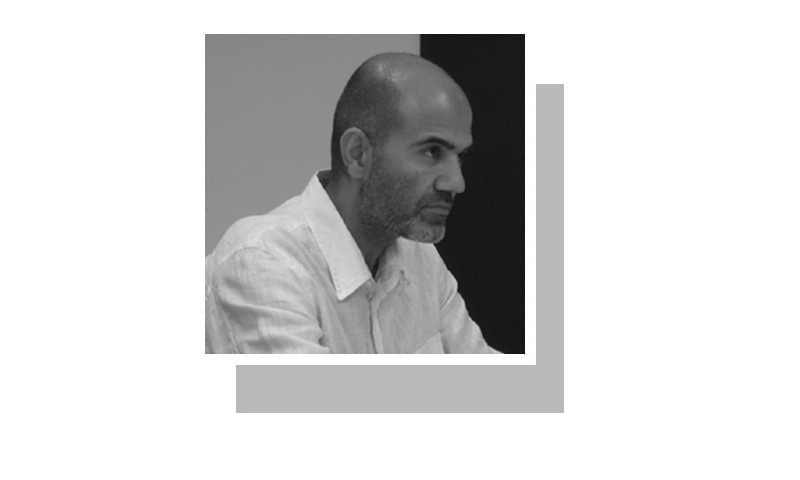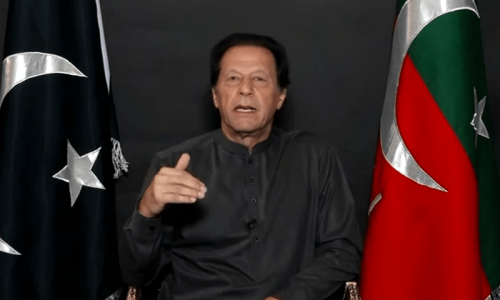THE drama draws to an end. Not that the PTI’s descent on Rawalpindi in the wake of the government’s announcement that Gen Asim Munir is to be the new army chief will change very much for the common hordes. But centring the welfare of the masses has never animated the corporate media — it is the desire to increase ratings that explains the endless commentary on the shenanigans playing out within Pakistan’s ruling class.
Intriguingly, the two biggest single players in the incessant palace intrigues of recent months have managed to find time for internal reflection amidst it all.
While Imran Khan has been lamenting his inability to cut the ‘real estate mafia’ down to size during his time in government, outgoing COAS Gen Bajwa has admitted to his institution’s decades-long unconstitutional political manipulations.
Both have book-ended their ruminations with promises that past mistakes won’t be repeated.
So what are this country’s working masses supposed to make of these highly choreographed disclosures? An end to dispossession and the land-grabbing antics of real estate developers and state institutions? Liberation from the combination of crippling IMF conditionalities and global economic shocks that deepen economic misery on a daily basis?
A swift return home for thousands of missing persons? A sudden rejigging of officialdom’s priorities and massive allocation of resources to the millions still suffering the fallouts of this summer’s floods?
No chance.
We should expect more of the same.
Let us start with the military and politics. Gen Bajwa will of course soon be out of the power loop so his comments have little bearing on what follows.
In any case anyone familiar with Pakistan’s contemporary political economy knows that the military’s corporate interests are simply too many and substantial for Bajwa’s pronouncement to be taken seriously.
Imran Khan, on the other hand, continues to insist that he is ordained to be back in the saddle soon. So should he be given another chance to do right? The leadership of the PML-N, PPP and others have certainly been given many opportunities in government. And Imran Khan, as he is so fond of reminding us, is not a dynast and therefore is genuinely deserving of another crack.
But dynastic or not, the PTI — like the PML-N, PPP and other contenders for a piece of the establishment-centric pie — has reinforced the moneyed rules of the electoral game. Some years ago, the Supreme Court issued a ruling in a petition filed by Abid Hasan Minto that a maximum of Rs40,00,000 can be spent on an election campaign for a National Assembly seat. All bourgeois parties dish out crores.
This is one of the major reasons why big capitalist lobbies, including real estate moguls, are so powerful.
They bankroll ‘electables’. This is not just a Pakistani phenomenon — corporate lobbies in the US, for instance, make a mockery of the notion that that elections are somehow a level-playing field for those whose political programmes are even mildly anti-capitalist.
Then there is the question of policy. The mushrooming of real estate schemes across Pakistan over the past few decades, and particularly during and after the Musharraf years, is one of the most prominent outcomes of the neoliberal straitjackets of financial liberalisation championed by the IMF and its sister institutions.
Big money is free to find profitable outlets without concern for labour standards, tax responsibilities and ecological sustainability. Given Pakistan’s particular brand of colonial statecraft, whereby ‘big men’ collude with state institutions to dispossess working people, financial liberalisation has translated into limitless grabs of land and other natural resources.
Even the notion of a benevolent capitalism is increasingly becoming obsolete; the potential profits from speculative real estate are rapid and exponential, so there’s little incentive for moneyed interests to invest in manufacturing industry that can produce jobs for Pakistan’s teeming millions.
Meanwhile, relatively well-off segments of the Pakistani diaspora also invest in gated housing communities back home; Imran Khan, it must not be forgotten, was convinced of the righteousness of money-whitening schemes in real estate and construction, and told his supporters both at home and abroad to put their money where their vocal mouths were. Lest anyone needs reminding, many of real estate ventures are tinged with the colour khaki.
So here we are again, with lots of rhetoric about how all will be different, when in fact we should expect more of the same. Rest assured that the merry-go-round of the past few months is not the last one to which we will be subjected, sensationalism and mediatisation now being the name of the game.
What we really need — and what at least some of Imran Khan’s youthful supporters ought to consider putting their weight behind — is a left-progressive alternative that can be trusted to do more than engage in selective regret.
The writer teaches at Quaid-i-Azam University, Islamabad.
Published in Dawn, November 25th, 2022














































